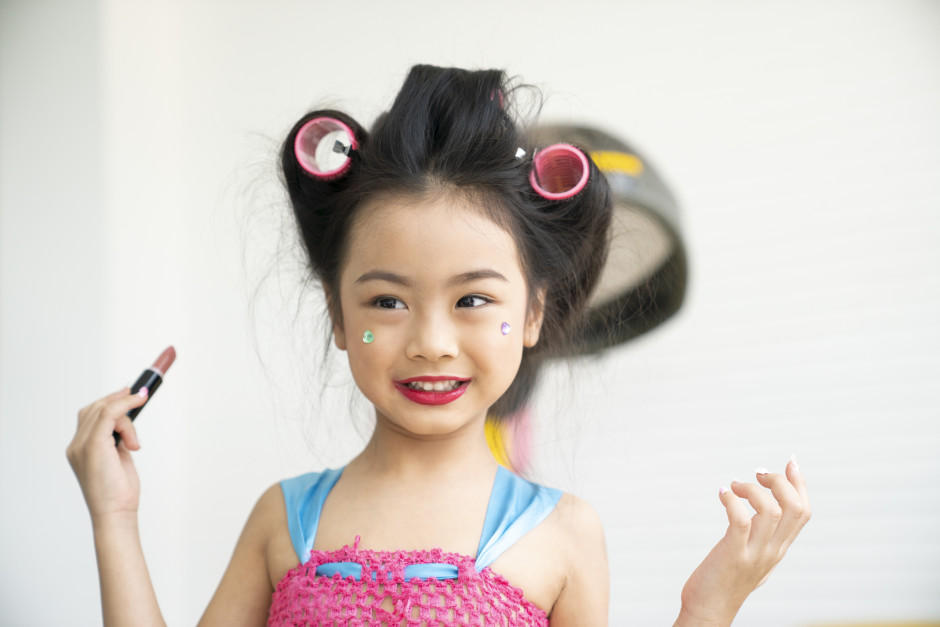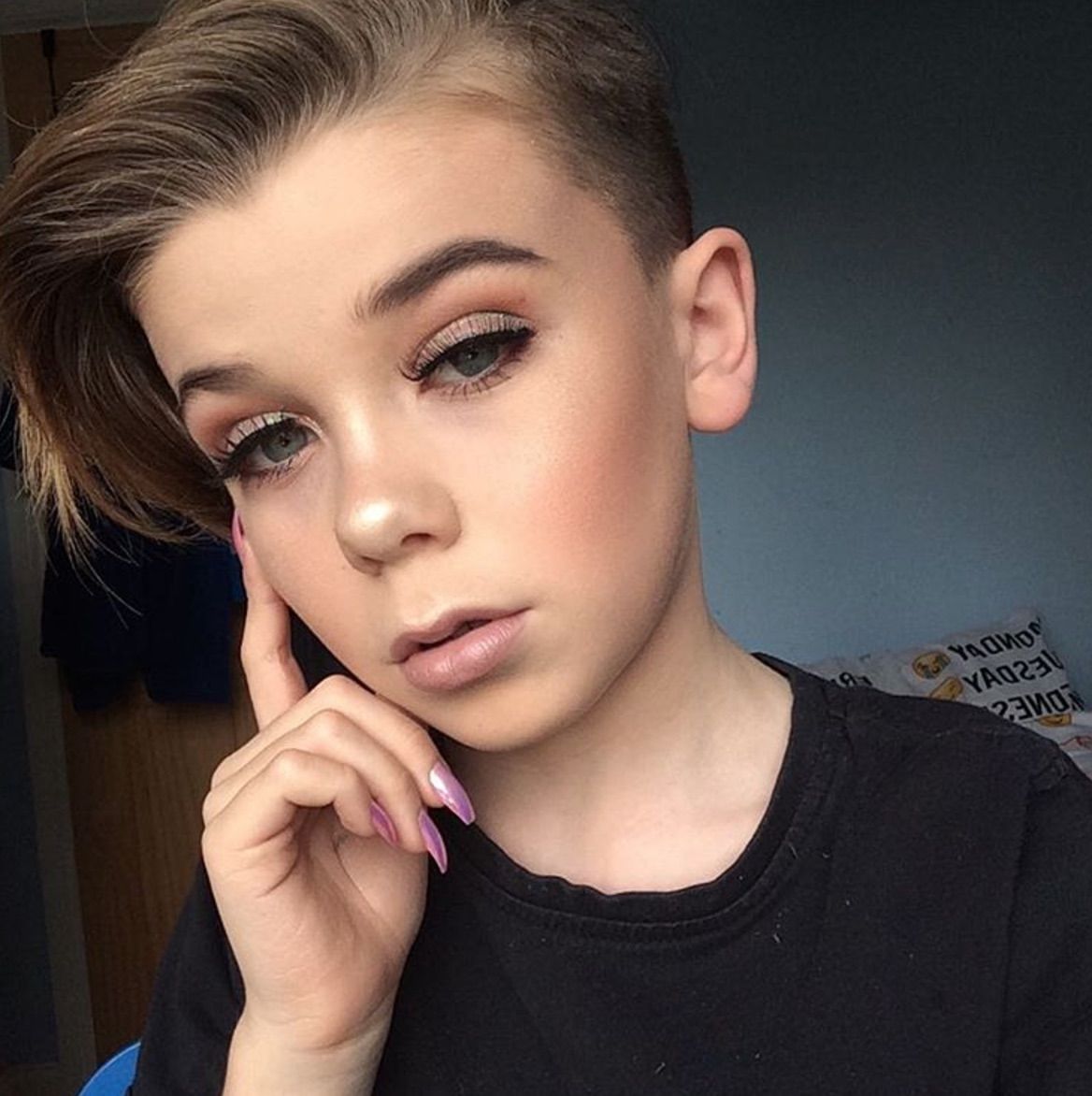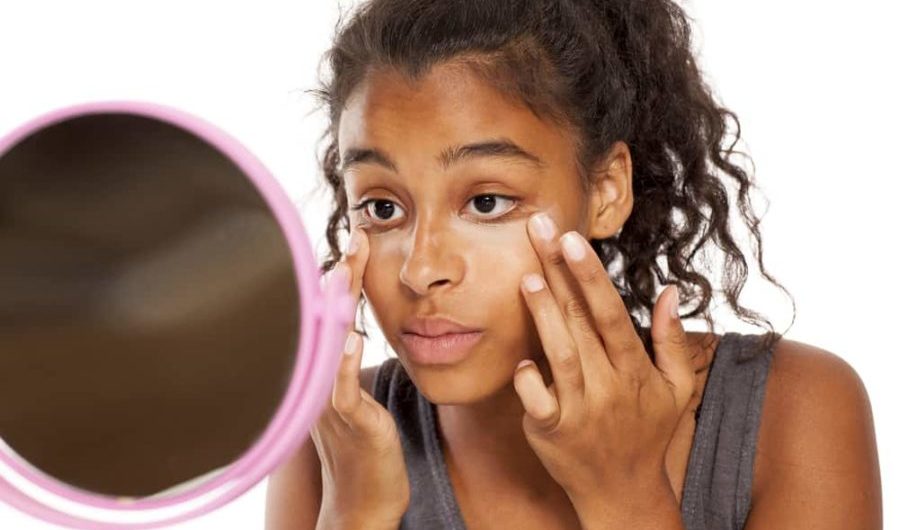When your child is twelve years old, she can begin wearing makeup according to the American Academy of Dermatology. If your child is under eighteen years old, ask a parent for permission before adding makeup to her daily routine.
As a rule, children should avoid using foundation because it may cause irritation or allergic reactions to their sensitive skin. Children should also avoid wearing mascara as well as heavily pigmented lipstick and eyeshadow because those products are difficult to remove from sensitive skin.
Do they really need to wear makeup?
You can improve the look and appearance of your child's skin by choosing healthy food and ensuring she gets enough to sleep each night. When your child turns eighteen years old, she is considered an adult with the ability to make her own decision about wearing makeup without requiring permission from a parent or guardian.
The American Academy of Pediatrics released the statement that children under fourteen years old should not wear makeup due to potential health risks. They also recommend avoiding colorful lipstick and eyeshadow, especially if they contain any heavy pigmentation. Children should never wear eyeliner, foundation, mascara, or eyebrow pencils because they pose a higher risk for allergies.
You may want to consider allowing your older daughter to try wearing makeup when has reached puberty after seeing how it looks with her skin tone. If your teen daughter is struggling with acne or has oily skin, you may want to help her choose the makeup that won't clog pores and trigger breakouts.
Watch out for heavy foundation which can exacerbate the problem by creating a barrier between oil glands in the face and fresh air. Your daughter should also avoid powdery products because they tend to make acne worse by trapping oil against the skin's surface.
At what age can your children wear makeup?
When your child is twelve years old, she can begin wearing makeup according to the American Academy of Dermatology. If your child is under eighteen years old, ask a parent for permission before adding makeup to her daily routine.
As a rule, children should avoid using foundation because it may cause irritation or allergic reactions to their sensitive skin. Children should also avoid wearing mascara as well as heavily pigmented lipstick and eyeshadow because those products are difficult to remove from sensitive skin.
What should you do if your child is too young for cosmetics?
In case your little child is too young for cosmetics, you may simply help her brush out the tangles in her hair so she can look neat and well-groomed. They can also wear a sunhat when outside to protect their face from direct sunlight or cold wind without requiring makeup.
You can prove to the child, that there is no need to add makeup to her daily routine in order to look beautiful and well-groomed even without the help of cosmetics. The girl should know that good behavior, polite manners, and being respectful to others can significantly improve her overall appearance.
Parents who do not allow their children to wear makeup argue that it is a matter of age appropriateness. According to them, it would be inappropriate for a little girl or boy to start wearing lipstick, blush, or foundation since they have not yet developed physically into adults. You may also want your child's teacher or school principal aware of this topic so she could decide whether the little one is mature enough for wearing high-end products on his face.

What about boys who wear makeup?
Teenage boys may be interested in wearing foundation, but they run the risk of breaking out. They should only wear makeup if it is for a special occasion. If your teen son has acne or oily skin, you may want to help him choose the makeup that won't clog pores and trigger breakouts.
Watch out for heavy foundation which can exacerbate the problem by creating a barrier between oil glands in the face and fresh air. Your son should also avoid powdery products because they tend to make acne worse by trapping oil against the skin's surface.
You shouldn`t shout at your boy if you see him wear makeup, this will be so uncool. He may use it for a special occasion or he just wants to experiment with new things. If you aren`t comfortable with your child wearing makeup, tell them why and try not to yell at them if they are doing something wrong because that won`t end up good for anyone.
What is the opinion of society about children wearing makeup?
Society seems to be divided into two broad groups based on their views about children wearing makeup. Some people believe that children should never wear makeup while others support the idea of allowing girls to start experimenting with colors as soon as possible even though they can pose some health concerns, especially if worn during sleepovers or trips away from home.
Some psychologists believe that encouraging children to wear makeup before the age of fourteen can be harmful because it could encourage them to become overly self-conscious about their appearance, lower their self-esteem or influence their perception of beauty standards. However, there are others who feel that learning these skills at an early age is perfectly fine and will help children learn how to apply makeup properly when they get older.
Help your child to choose cosmetics
It is better for you to help your girl or boy with cosmetics choice, this will give you an opportunity to know what he or she is using and how often.
You can advise your child to remove makeup before going to bed and replace it with a moisturizer that will not clog pores. Ask your son or daughter to wash their face every morning before putting on foundation, even if they don`t wear makeup every day.
Advise them not to wear mascara because it can cause irritation and other reactions associated with sensitive skin including itching, eye infections, and allergic reactions. Be sure to check the ingredients in any cosmetics your child might be using regularly as some chemicals such as dyes, sulfates, and parabens may be harmful to their health.
When your child has special needs it is important that you carefully check the ingredients in their cosmetics because some of them may irritate certain skin conditions such as eczema and rosacea. Children with allergies can also react badly to makeup, so if your child's eyes water or they begin sneezing after applying makeup, stop them from wearing it immediately.
Although most children can start wearing lipstick when they reach puberty, if your daughter experiences early signs of puberty such as pubic hair growth and breast development before age ten, let her wear lipstick before other girls her age do because this may influence her emotional state.

Useful makeup basics
So, when you have already given advice on cosmetics selection, it is time to talk about some other important steps. For example, your child should wash the face every morning and night to control excess oil and remove makeup build-up from the day before. They should use a gentle, non-drying soap such as Cetaphil or Dove to avoid stripping the skin of its natural oils and use creams with ingredients like lanolin and paraffin which can irritate sensitive skin.
They also need to avoid products with drying effects because this will make their skin worse instead of better. It is great for children if they use moisturizers with SPF 15 during the day and cleansers that target acne breakouts such as Neutrogena's Clear Pore Cleanser or medicated toners such as Clinique's Clarifying Lotion 2.
Your daughter should avoid applying too many products because this could irritate the skin, clog pores and lead to blackheads or acne. If your child has dry or sensitive skin it will be better for her to use products with an oil-free formula such as Neutrogena's Oil-Free Acne Wash Sensitive Skin, Aveeno's Moisturizing Bar For Sensitive Skin or Eucerin's DermoPurifyer Mild Body Wash Cream.
In addition, if you notice redness of your child`s skin after cleansing, blemishes, or broken veins on parts of his face where she applies cosmetics regularly ( e.g., eyelids), he might be allergic to some of the products he uses.
It will be great if you take cosmetics your child uses at least once a week to test whether they have any allergies to certain ingredients. You can do this by applying some of her favorite products onto the inside of the lower portion of her forearm and waiting for 12 hours. If there is no redness, itching or irritation at that spot by morning, it means your child isn't allergic to these ingredients.
It may be recommended for children with extremely sensitive skin who experience frequent breakouts or irritations when they use certain types of makeup including blushes or eyebrow pencils. It is great if your child uses hypoallergenic cosmetics because they can reduce the risk of breakouts and skin reactions.
Possible allergens in cosmetics
Now that you know what hypoallergenic means let`s list some ingredients which are considered to be common allergens; therefore, they should be avoided by children who have sensitive skin:
- Lanolin (e.g., lip balms)
- Methylisothiazolinone (MI) (e.g., moisturizers)
- Dibutyl phthalate (e.g., nail polish)
- Parabens (e.g., moisturizers)
- Fragrance (e.g., makeup products, shampoos, and body washes)

Therefore, it is critical to watch out for these ingredients because they can cause irritation, dryness, or redness on the skin of your child which might be followed by breakouts.
What is more, if you notice that your child has developed any redness or rashes after using certain cosmetics remove this product from her/his skincare routine immediately and consult either an allergist or dermatologist.
What brands to choose?
It is super important for children or adults to use cosmetic products containing ingredients that are proven to be safe and effective. This means checking the label of each product before buying as not all cosmetics sold on the market meet these requirements.
As a parent, you should encourage your child to use brands that offer hypoallergenic and dermatologist-tested cosmetics such as Neutrogena, Aveeno, Olay, and CoverGirl because they can help reduce the risk of skin irritations and allergies.
In addition, read reviews written by other customers who have tried particular products before purchasing them because this can give you an idea about their quality and effectiveness. What is more, if your child has acne it will be great if she uses makeup brands with helioplex technology such as Neutrogena Healthy Defense Daily Moisturizer with Sunscreen Broad Spectrum SPF 50 and Clean & Clear Advantage Acne Control Treatment.
Important makeup tips
It is also critical for children to follow certain skincare rules in order to make their skin healthier, beautiful, and radiant. First of all, they need to avoid hot showers or baths because this can dry out the skin and irritate the body's largest organ.
Secondly, it is never recommended to use products that contain ingredients like lanolin (e.g., lip balms), parabens (e.g., moisturizers) or fragrances which are known allergens because they can cause redness, irritation, or allergic reactions.
Thirdly, it is highly recommended to use hypoallergenic and water-based or oil-free cosmetics such as Neutrogena, Aveeno, and Olay products that are proven to be gentle on the skin.
Do not forget to regularly apply sunscreen with SPF 15 or higher during the day to protect your child`s skin from harmful UV rays which can cause sunburns, dryness, and even cancer in some cases.
Skincare routine before applying makeup
Finally, your child already has all the necessary items, and there is time to prepare the skin for the upcoming makeup application.
In order to make his skin beautiful and radiant please share with your child a skincare routine before applying makeup. First of all, she/he should wash the face with water only (no soap, no exfoliants) to remove any excess oil or dirt. After this, they should apply either an alcohol-free toner or moisturizer if the skin is dry because it needs hydration, especially during wintertime.
Then a child can use foundation primer to improve the quality of the foundation which will be applied on top of it by making its texture more uniform and smooth thanks to ingredients used for its products such as glycerin. Additionally, primers are able to fill in fine lines, pores, and wrinkles which means that they can hide them.
Apply a thin layer of foundation by using either a makeup sponge or a foundation brush starting from the center of your face and blending it towards the hairline, jawbone, and neck. Now you can use bronzing powder to contour cheekbones and finish eye makeup by applying an appropriate amount of mascara on top eyelashes.